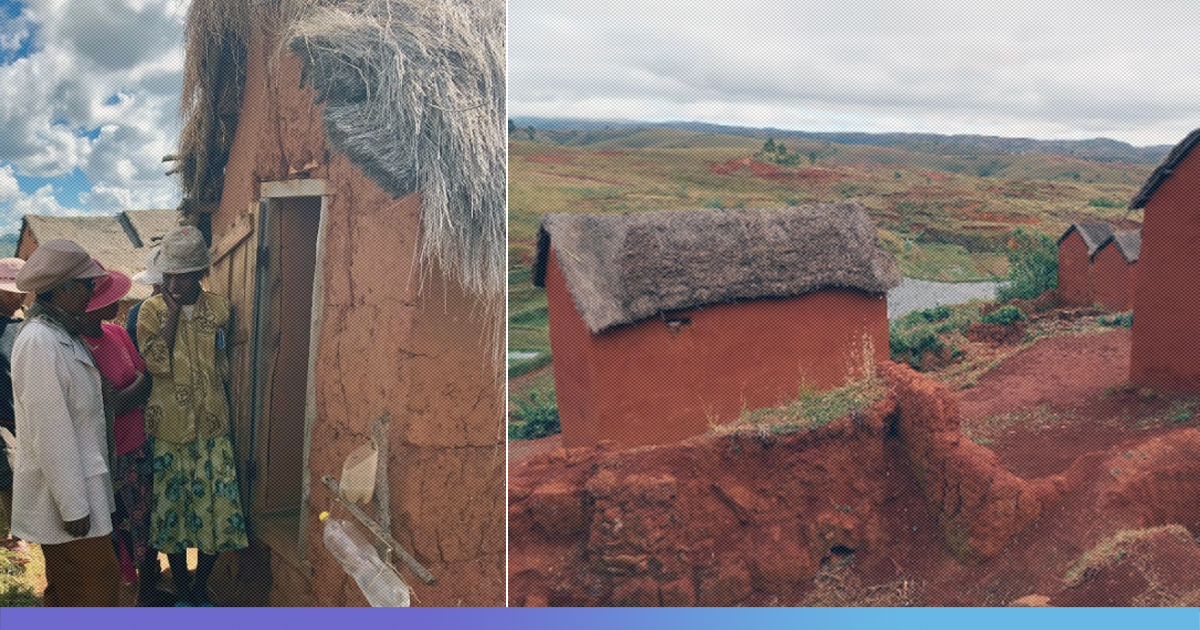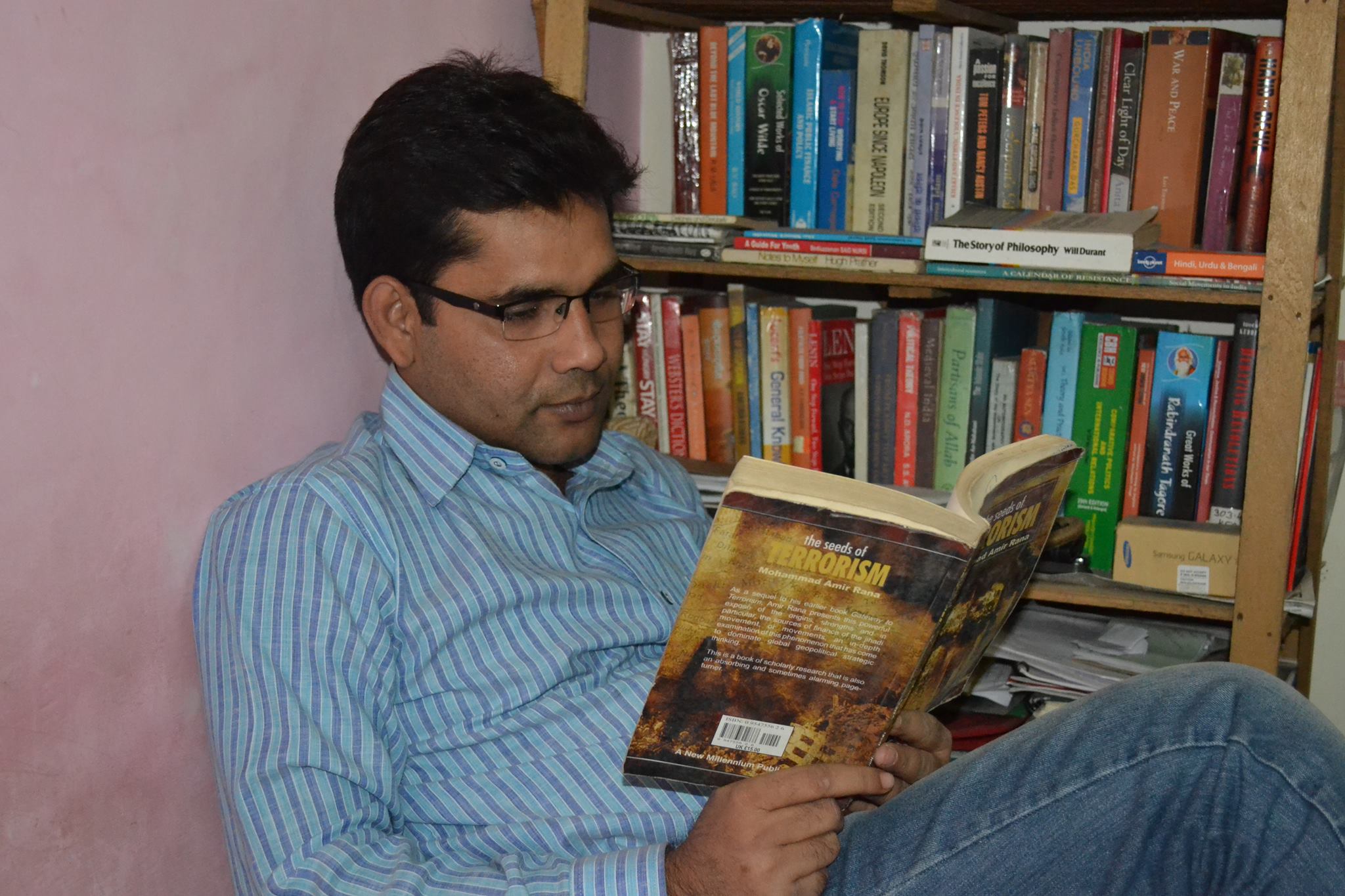
How Community Triggering Is Awakening Madagascar Villages To Dangers Of Open Defecation
8 July 2019 10:27 AM GMT
The discussion with villagers starts early in the morning. Volunteers are invited to draw a map of their village on the ground with chalk. One woman’s sketch shows 17 families – a total of 65 people – living in 11 red clay houses. She explains they share the three latrines that have been there for some time.
The village is Andoharanovelona, 60 kilometres south of Antananarivo, the capital of Madagascar. The conversation is led by a team of four sanitation practitioners working with a local non-governmental organization known as Miarintsoa.

Eugène Rasamoelina, the head of Miarintsoa, asks the participants how often the latrines are used and whether three latrines are enough for all 65 residents. At first, they are too shy to respond, mumbling that this is none of their concern and they wouldn’t pay attention to this type of personal business. But after a few questions, they reluctantly acknowledge that they rarely use the latrines, instead turning to open defecation.
Careful to ensure the villagers are comfortable continuing the conversation, Eugène takes out a bag of sawdust and asks them to sprinkle its contents on the drawing of the village to indicate where they defecate in the open. Eucalyptus trees and a pond at the outskirts of the village are soon covered with piles of wood particles, with a few piles placed inside the village, as well.
As they take a long and hard look at the sawdust scattered across and outside the sketch of their village, Eugène raises the issue of flies and their role in oral-fecal transmission.
“Flies can transfer fecal material to the food and then to the mouth,” he explains, and a startling revelation comes over the village dwellers. At the end of their two-hour discussion, the residents tell the practitioners they will continue their conversation and take action.
Eugène agrees to come back and follow up with them on the following day. “When we visit villages that practice open defecation, our main message is how human excrement can contaminate or pollute human beings,” he says.

The approach used by Eugène and his team is known as ‘community triggering.’ In this approach, practitioners serve merely as facilitators. Their role is not to pressure community members to stop open defecation immediately but rather to give them the power to lead their own initiatives and make well-informed decisions in transforming their villages.
With the support of WSSCC, community triggering is employed by 18 implementing organizations across Madagascar in their work to eliminate the practice of open defecation.
A programme body in Antananarivo known as Fonds d’Appui pour l’Assainissement (FAA), which translates into English as Sanitation Support Fund, manages WSSCC’s Global Sanitation Fund in Madagascar and supervises all the implementing partners. Its director, Dr. Rija Fanomeza, describes three factors partners should consider in carrying out activities in communities.
First, all open defecation sites should either be cleaned up or transformed into playgrounds, cultural places or other public gathering spots to stop the contamination and transmission of disease.
Secondly, even if open defecation areas are eliminated, latrines must be designed to be fly-proof to prevent transmission of excrement to human beings or animals, otherwise a village cannot be certified as open defecation free (ODF).
Finally, even if open defecation areas are cleaned and people use fly-proof latrines, there is still a risk of contamination unless people wash their hands when exiting the latrines, for which the use of soap – or ash as a low-cost alternative – for handwashing is a key indicator.
However, not all ‘triggering’ activities result in the successful awakening of communities and the pursuit of concrete actions. Clara Rudholm, East and Southern Africa Regional Manager for WSSCC, has seen some villages continue to cling to the status quo even after WSSCC-supported triggering activities.
“Everybody knows that changing behaviour is a long-term process and it takes a lot of time to see tangible gains. It can be easy to skip a few steps and give latrines or other donations to villagers for free. This must be avoided as such external interventions can actually result in a setback. The will to change behaviour must come from within. Families and communities, not outsiders, are the true owners of the process,” she said.
In May, Clara visited a village in the Itasy region, nearly 90 kilometres west of the capital, where inhabitants had undergone triggering conducted by a WSSCC implementing partner. However, the community decided not to carry through actions to end open defecation, explaining that they didn’t have the financial means.
On the spot, Clara proposed that one of the residents accompany her in a visit to the nearby village of Tsaramasoandro which had been open defecation free since 2014, and a woman named Perline took her up on the offer. Solofoniaina Ramanamison, President of the Amparibohitra Fokontany (neighborhood) and his wife showed Perline the latrine that they had recently constructed. They proudly showcased the concrete foundation and slab with stones underneath to make the latrine sustainable.
“This latrine cost us around 200,000 Malagasy Ariary (US$55) including the digging of the pit, which is 10 meters deep. We are not thinking of building another latrine anymore and will take care of this latrine for a long time. Our previous five-meter-deep latrine lasted 20 years, so we assume this one will last 40 years,” said Ramanamison, also pointing at the flowers planted in front of his latrine, “Latrines shouldn’t smell bad as people think. It can be attractive.”
He told Perline that since they became ODF, they have been visiting the health centre much less frequently and can now use the money saved by having fewer medical treatments to pay to improve latrines.
Since the village became ODF, Ramanamison has been also encouraging his constituents to build shower rooms for girls and women who menstruate. These additional facilities helped the female half of the village population improve not only their physical health but also their social well-being.
“Before, it was shameful to talk about menstruation between fathers and daughters. But now fathers know about it and women are not shy to go to the shower room,” a local woman said.
Perline told Ramanamison that she was quite amazed to see what they have. In her village, only a few of them have latrines and all of them are still using mud slabs instead of cement ones.

“What I have discovered was a clean village, hygienic latrines and the know-how of the people. I want to meet with our fokontany president and explain what has happened here with this president,” she said.
According to the World Bank, 77 percent of the Malagasy population – totalling some 24 million people – is estimated to live on less than US$1.90 a day, which places Madagascar among the poorest countries in the world. WHO and UNICEF’s Joint Monitoring Programme reports that 11.3 million people in Madagascar defecate in the open.
WSSCC supports the work of the Fonds d’Appui pour l’Assainissement in 21 of 22 regions across Madagascar, overseeing 18 implementing partners. As of December 2018, more than 17,000 villages are declared open defecation free, 2.12 million people live in ODF environments and 3.74 million people use improved latrines.
Sue Coates, Executive Director ad interim at WSSCC says that attaining ODF status is not a final stop for the communities. In fact, ODF is just the beginning of a series of life improvements.
She says, “after working hard to make their own villages free from open defecation, communities become increasingly resilient and willing to continue sanitation improvements. They are also better able to tackle other issues such as menstrual hygiene management, health, nutrition and economic growth. With WSSCC grant support, communities are steadily building on their strengths, one step after another, and improving the well-being and prospects for everyone, leaving no one behind – this is the approach we advocate to our national and global partners.”

In another Malagasy village that achieved the ODF status, residents are busy discussing how to improve a latrine for elderly people and those with disability. Ramananjatovo injured his leg five years ago when he was 77 years old and has been since using a walking cane. The inhabitants are talking about how to make the staircase less steep to give him easier access to his latrine while adding a grab bar closer to the pit.
“Hygiene concerns everybody, not only one household. Everybody, old or young, deserves good sanitation and a clean latrine,” said one of the residents in Behorimo Fokontany.
While residents at post-ODF villages continue improving their sanitation and hygiene environments, another sanitation practitioner is pushing further to maximize the potential of ODF communities to improve health and nutrition.
Dr. Léon Ravelonjato is the head of Adema, the implementing partner of the Fonds d’Appui pour l’Assainissement in Itasy Region, and an experienced facilitator on the community triggering activities. He has recently taken up a five-year nutrition project, which is funded by the World Bank. The objective of his project is to reduce the malnutrition rate in the region from 64 to 32 percent in five years.
He will be employing an approach to capitalize on the network he has already established through his sanitation interventions and build on the momentum created across ODF villages to further improve their livelihood. He says the presence of local leaders and community members that are engaged and empowered with palpable results will be particularly helpful to embark on the next challenges.

“We have two good opportunities. One is that there are a lot of local actors in the regions emerging from the ongoing sanitation programme supported by WSSCC – community leaders, local practitioners and authorities at the community level – who are already working on open defecation,” said Dr. Ravelonjato. “The other is that there are now numerous model ODF villages where a huge difference can be seen. So, we are now focusing on overcoming these post-ODF challenges. We have human resources and a field to operate in. We don’t need to create a new thing,” he said.
Dr. Ravelonjato has been also working to innovate the faecal management in his region by recycling human waste into agricultural fertilizer, which will contribute to the local employment and food production.

Dr. Joelina Ratefinjanahary, CLTS Coordinator at the Fonds d’Appui pour l’Assainissement, explains that Dr. Ravelonjato and his team have made 800 villages open defecation free since 2012 and that in each of the ODF villages he has seen the reduction of diarrheic diseases.
“This is why the project to fight against diseases and malnutrition is much more efficient in ODF villages than in non-ODF villages. I believe that’s the main reason Adema was chosen to lead the activities to fight against malnutrition in Itasy Region,” said Dr. Ratefinjanahary.
Authors: Hiro Saito and Charles Dickson from Water Supply & Sanitation Collaborative Council (WSSCC), Switzerland.
Also Read: 155 Villages Falsely Claimed To Be Open Defecation-Free In Madhya Pradesh, Action Initiated
 All section
All section













